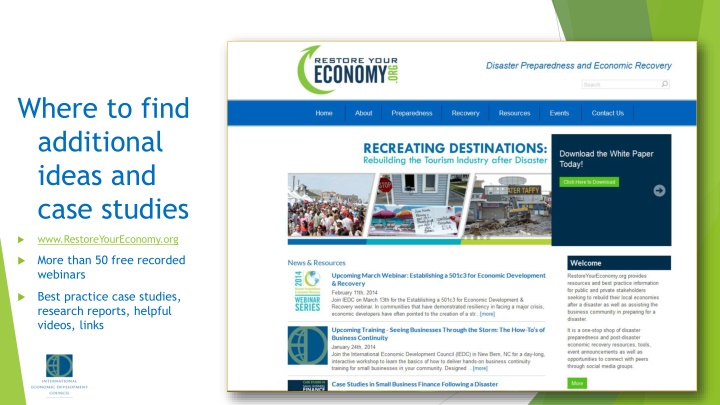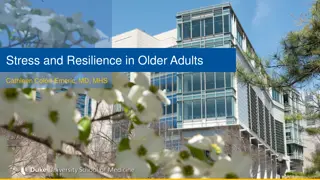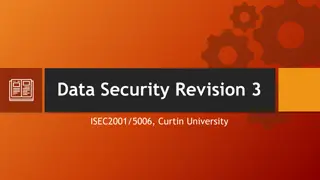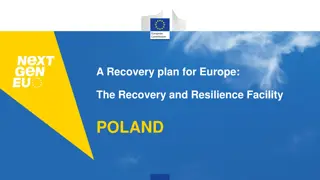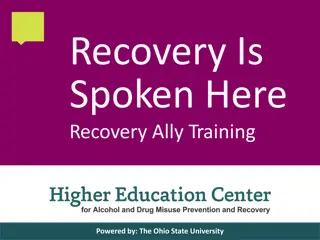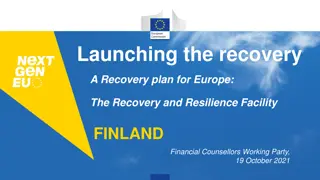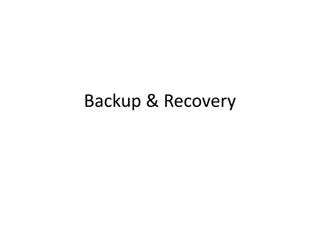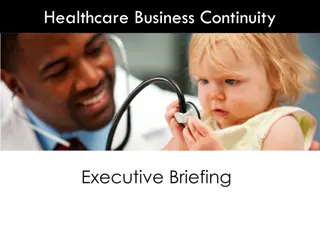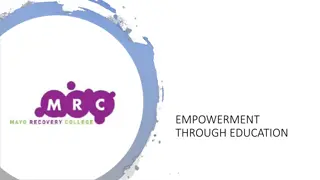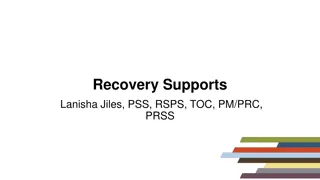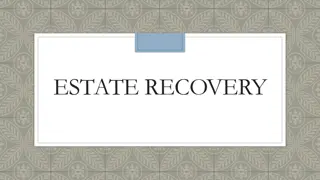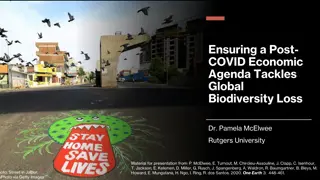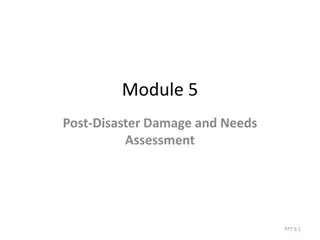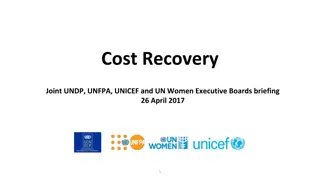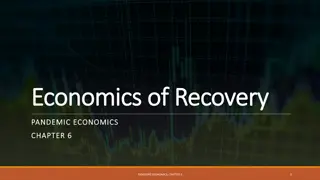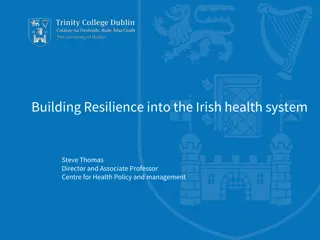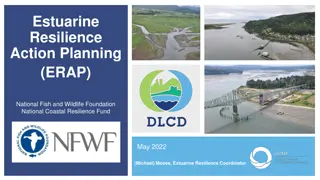Comprehensive Resources for Economic Recovery and Resilience Planning
Explore a wealth of resources on economic recovery and resilience planning, including webinars, case studies, toolkits, and thought leadership. Discover best practices, research reports, and insights to help communities navigate disasters and build resilience. Access free materials from organizations such as RestoreYourEconomy.org, U.S. Economic Development Administration, and National Association of Development Organizations (NADO) Research Foundation to aid in long-term recovery and mitigation strategies.
Download Presentation

Please find below an Image/Link to download the presentation.
The content on the website is provided AS IS for your information and personal use only. It may not be sold, licensed, or shared on other websites without obtaining consent from the author.If you encounter any issues during the download, it is possible that the publisher has removed the file from their server.
You are allowed to download the files provided on this website for personal or commercial use, subject to the condition that they are used lawfully. All files are the property of their respective owners.
The content on the website is provided AS IS for your information and personal use only. It may not be sold, licensed, or shared on other websites without obtaining consent from the author.
E N D
Presentation Transcript
Where to find additional ideas and case studies www.RestoreYourEconomy.org More than 50 free recorded webinars Best practice case studies, research reports, helpful videos, links
Toolkit for Economic Recovery & Resiliency Available free on www.RestoreYourEconomy.org 2
Quick read papers & brochures for download Updated in 2018 3
Thoughts on economic recovery and resilience leadership When you think that you have little capacity to carry through a situation, please know that Your recovery team is bigger than you realize: federal and state partners, public and private resources, volunteers with expertise. Every community is unique, but there is a playbook for disaster recovery and there are certain best practices we can help you with. Resilience thinking must become a core value, because any disaster that happens once can happen again. Comprehensive planning and follow through will define the risks and vision for resilience. Financing remains a critical need for long-term recovery, but this can be leveraged through public-private partnerships, federal assistance, volunteer work and donations.
Resilience in Economic Development Planning was published by the U.S. Economic Development Administration (EDA) with assistance from the Federal Emergency Management Agency (FEMA) https://www.eda.gov/files/about/disaster-recovery/EDA_CO- Economic-Resilience-Planning_Oct2014.pdf For more resources to support recovery and resilience following economic disruptions, visit the US Economic Development Administration's Disaster Recovery pages at: https://www.eda.gov/programs/disaster-recovery/
Economic recovery and mitigation National Association of Development Organizations (NADO) Research Foundation has resources for building mitigation strategies into economic development plans, highlighting data, analysis and metrics to consider: Resilient Regions: Integrating Economic Development Strategies, Sustainability Principles, and Hazard Mitigation Planning Building Economic Resilience in the Kerr-Tar Region: Recommendations for Linking Comprehensive Economic Development Strategies and Hazard Mitigation Plans. Excerpt from Measurement Section: 6
Decision making Tools for economic resilience and Diversification The following tools support decision making for economic diversification, to reduce reliance on sectors that are particularly vulnerable to hazards and change: Triple Bottom Line (Portland Statue University) Provides information on the broad economic, social, and environmental impacts development decisions that can support informed decision making. Investment Analysis (Purdue University & Indiana Business Research Center) Tools to assist practitioners in prioritizing projects. EDGe$ Tool (National Institute of Standards and Technologies) Software-based technique for selecting cost-effective community resilience projects based on the process found in the Community Resilience Economic Decision Guide for Buildings and Infrastructure Systems.
Economic resilience of key sectors Industry Sector-Specific Guides provide frameworks for business continuity planning, hazard mitigation, insurance and related resilience considerations: Leisure, Hospitality, and Retail Services (PDF) Biotechnology, Pharmaceuticals, and Life Sciences (PDF) Advanced Manufacturing (PDF) Health Care (PDF) Financial Services (PDF) Information Technology (PDF) Transportation, Logistics, and Distribution (PDF) https://www.eda.gov/programs/disaster-recovery/ 8
Finally Data, strategies and case studies for aligning smart growth with disaster mitigation and resilience plans are also available: National Institute of Building Sciences (FEMA and EDA) Multi-hazard Mitigation Council s Natural Hazard Mitigation Saves 2017 Interim Report National Oceans and Atmospheric Administration (NOAA) https://coastalsmartgrowth.noaa.gov/resilience.html US Environmental Protection Agency (EPA) https://www.epa.gov/smartgrowth/smart-growth-strategies-disaster- resilience-and-recovery 9
Contact info for federal representatives that participated in US Virgin Islands workshops: Elsa Alvear, US Department of the Interior, National Parks Services, elsa_alvear@nps.gov Michael Fesko, Public Health Analyst, US Department of Health and Human Services, Federal Drug Administration, michael.fesko@fda.gov Rick Florence, US Department of Agriculture, rick.Florence@tx.usda.gov Jessie Huddleston, Community Planner, FEMA, jessie.huddleston@fema.dhs.gov Wayne Huddleston, Senior Area Manager for USVI, US Small Business Administration, Charles.huddleston@sba.gov Beth Gratzer, Community Planner, FEMA, beth.gratzer@fema.dhs.gov Nancy Gilbert, US Department of Commerce, Economic Development Administration, ngilbert@eda.gov 10
Contact info for federal representatives that participated in US Virgin Islands workshops: Scott Jackson, US Department of Commerce, National Telecommunications and Information Administration (NTIA), sjackson@ntia.doc.gov Ken Rathje, Federal Disaster Recovery Coordinator, FEMA, Kenneth.rathje@fema.dhs.gov Pam Swingle, Sustainability Advisor, US Environmental Protection Agency, swingle.pamela@epa.gov Steve Wade, Federal Disaster Recovery Officer, FEMA, Stephen.wade@fema.dhs.gov Mark Wolfe, US Army Corps of Engineers, Mark.E.Wolff@usace.army.mil 11
THANK YOU to the following USVI Agencies and Organizations that participated in these workshops! VI Department of Planning & Natural Resources VI Department of Tourism VI Economic Development Authority VI Housing Finance Authority VI Next Generation Network VI Office of Management & Budget VI Small Business Development Center VI Workforce Development Board USVI Hurricane Recovery and Resiliency Task Force West Indian Company Community Foundation of the Virgin Islands Downtown Revitalization Inc. (Charlotte Amalie) St Croix Foundation for Community Development St Thomas St John Chamber of Commerce United Steelworkers Local University of the Virgin Islands VI Bureau of Economic Research VI Department of Education VI Department of Finance
